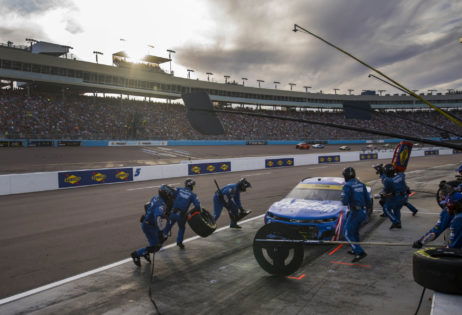In the high-stakes world of NASCAR ownership, the charter system was meant to bring structure, legitimacy, and long-term sustainability to the racing teams. Introduced in 2016, the charter model allowed owners to purchase guaranteed race entries, which is akin to franchising. It gives them financial security and a tangible asset that could be resold. Some fans initially balked at the exclusivity of the system. Others praised it for finally giving teams a way to recoup investments. But that very system has now come under scrutiny again as the attempted acquisition of a Rick Ware Racing (RWR) charter by Legacy Motor Club with the help of T.J. Puchyr has ignited a wildfire of accusations, lawsuits, and reputational reevaluations.
At first glance, the situation appeared simple. Legacy Motor Club, bolstered by the star power of co-owner Jimmie Johnson. The club aimed to purchase a charter from RWR to expand its competitive footprint. To navigate this complex, high-dollar transaction, they brought on T.J. Puchyr. He was then viewed as a well-connected insider and consultant to broker the deal. For RWR, offloading a charter to a growing team like Legacy seemed mutually beneficial. But as legal filings would later reveal, this partnership quickly soured. Legacy alleges that Puchyr exploited his insider access to the deal, then pivoted to buy RWR himself. What started as a clean acquisition has now turned into an ugly legal drama, filled with depositions, accusations of bad faith, and a larger question. Has NASCAR’s charter system opened the door to unchecked power plays?
This is where the “shady” label, long associated with high-profile ownership figures like Puchyr and Rob Kauffman, comes into play. In the past, both men have held substantial influence behind the scenes. Kauffman as the architect of the charter system and chair of the Race Team Alliance (RTA), and Puchyr as a team executive and dealmaker. The NASCAR faithful didn’t like either of them. Critics often painted them as opportunists who reshaped the sport to suit big-money interests. But in the wake of the Legacy lawsuit, fans are beginning to draw sharper lines. Kauffman, once lumped in with speculation-driven ownership, is now being reexamined. Initially, there was quite some excitement over this charter news. Now, fans are unsure whether Legacy would even field a 3rd car next year.
The contrast between intention and execution could not be clearer. NASCAR designed the charter system to provide stability and incentivize competitiveness. But now, a messy power struggle surrounds it. Legacy lost trust in the system and in those who were supposed to support it. And fans have taken notice. Social media users have flooded platforms with sharp critiques, calling the situation a hijacking of NASCAR’s core values.
Fans make their opinions known on NASCAR drama.
One fan framed the issue with historical clarity. They argue that “before Rob Kauffman, charters didn’t exist… pretty much anyone could own a team if you had the funds.” This underscores a fundamental shift. From a merit-based system of car-and-driver to one of asset-based gatekeeping. But the same fan also defended the charter model, explaining that charters have given value to a team’s exit strategy. They stated, “It used to be before charters, you’d sell all your equipment for pennies on the dollar when you wanted to get out. Now you have a charter worth millions.” However, the system’s evolution has raised uncomfortable questions about who gets to control access and at what price.
Another voice offered a more pointed character analysis. “Kauffman wasn’t shady. Rather, he was arrogant.” According to their perspective, Kauffman believed in a top-heavy version of NASCAR. One where only big-budget teams deserved space on the grid. They went on to give their opinion on Kauffman’s belief. “All NASCAR teams should be money bags, and if you are a smaller funded team, then you are a disgrace to the sport and should be ashamed.” In contrast, Puchyr’s alleged betrayal of Legacy adds a new layer of discomfort. Arrogance may be tolerable, but exploitation is not.
credit: imago
One particularly blunt comment summed up the broader discontent. “What is wrong with T.J. Puchyr and Rob Kauffman?” This was not a question looking for clarity, but an indictment. The fan elaborated on a pattern of lawsuits, power grabs, and shady backdoor dealings, culminating in frustration over how these figures seem more interested in flipping assets than sustaining legacy.
Another fan commented, “Why does the sport keep letting these types into ownership?” The rhetorical question underscored a larger fear. NASCAR is losing control of its cultural foundation. To many, the rise of investor-heavy teams threatens the balance between profit and passion. The concern is not only who gets to own a team, but what they intend to do with that power once they have it.
Lastly, a fan lamented, “It’s quite obvious the RTA and charters have been detrimental to the long-term dedicated people…” They argued that the system favors those who see racing teams as stock options rather than a lifelong craft. This criticism ties directly to the escalating presence of financial conglomerates and opportunistic actors in NASCAR. The once community-driven paddock, they fear, is morphing into a marketplace.
In peeling back the layers of NASCAR’s latest ownership saga, it becomes clear that the “shady” label is no longer a one-size-fits-all insult. Kauffman is now seen by some as a flawed but stabilizing force. Meanwhile, figures like Puchyr have taken center stage in the sport’s ethical debate. The charter system, while valuable in theory, now sits in the crosshairs of a fan base demanding accountability. Not just for results on the track, but for deals made behind closed doors.
The post Previously Branded as “Shady”, Veteran NASCAR Owners Scrubbed Off of Title by Fans appeared first on EssentiallySports.
